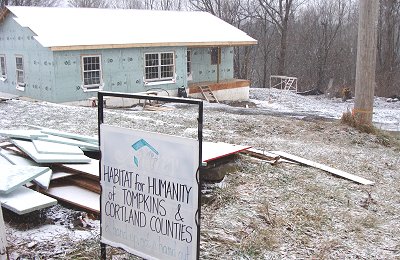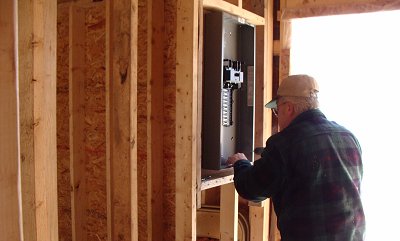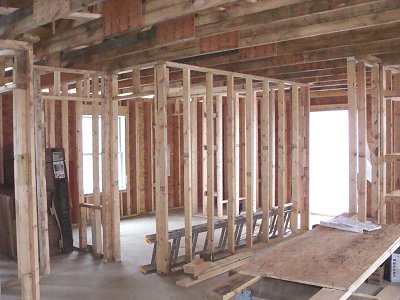- By Dan Veaner
- Around Town
 Print
Print  If you haven't driven by the Lansing Habitat For Humanity site on Breed Road recently, it looks a lot different: there is a house there. Volunteers have gotten the foundation and framing done, and the roof is nearing completion. The push now is to get electricity hooked up and a boiler installed so the house can be heated for volunteers working this winter.
If you haven't driven by the Lansing Habitat For Humanity site on Breed Road recently, it looks a lot different: there is a house there. Volunteers have gotten the foundation and framing done, and the roof is nearing completion. The push now is to get electricity hooked up and a boiler installed so the house can be heated for volunteers working this winter."Right now we're really trying to push," says Construction Committee member Ed Siemon. "Our goal is to get the Certificate of Occupancy before the tax benefit expires around April. We have people out there almost every day doing something."

Siemon says that an admittedly ambitious finish date in August was pushed back by unexpected delays. Placing the house turned out to be a problem because the usable land made for a very tight fit for the house, septic system, and well. And the house plans turned out not to have detail drawings included, so an architect had to be engaged to complete them. That pushed the functional start date to July, and crews have been volunteering ever since.
The delays hurt the project, because contractors that were lined up for the project could no longer participate when the building schedule slipped so drastically. They had paying projects lined up. But Dean Shea of Sunnybrook Builders has taken a leading role in getting the house up, spending time working on the project and finding contractors for the septic system, plumbing, and electricians.
Build sessions are scheduled Wednesdays, Fridays, and two on Saturdays. Sometimes Sunday sessions are added. In addition to individuals volunteers have come from Cornell, TC3, Ithaca College, SUNY Cortland, church groups, and two Lowes-sponsored Women Build events that attracted about 50 women. There is a core of about a half dozen volunteers that help supervise the various volunteer crews that show up.
"We try to give new people a safety course," Siemon explains. "Then we try to find out what skills they may or may not have. We've had people out there who have never handled a hammer before, and we've got them hammering. We love to get new people there, and most are enthusiastic. That's part of what we're doing, getting people involved so they're part of the house."

The original estimate was that the house would cost about $90,000 to build, and Siemon says it has yet to be seen what the final total will be. He says that they look for donations, especially from contractors who must do professional work. The excavation was entirely donated except for fuel and the cost of transporting the heavy machinery to the work site. The well digger provided a 10% discount, and a lot of the lumber is purchased at a discount.
Additionally Habitat works with some companies that entirely donate materials. Square D donates the electrical boxes, Whirlpool the sinks and appliances, and others that give discounts for flooring. "We're fortunate," Siemon says. "We have a lot of good people around here."

Those people have already put in a lot of time. As of a week ago 42 eight hour work sessions had been held. Amber Little, who will move into the house with her two young sons when it is completed, has been helping on the Friday sessions, and doing other work as much as she can. Siemon notes that she and her friends and family must commit 500 hours to the project as a condition of getting the house. He says her father is on the site nearly every day.
Habitat for Humanity of Tompkins and Cortland Counties Executive Director Christy Voytko announced this week that the next Habitat house will be built at 6 Wellsley Drive in the Village of Dryden. Geoffrey and Jessica Couch and their family will be the recipient family.
"We are thrilled to be building in Tompkins County again next year," she says. "Dryden will be a great location for volunteers from both Tompkins and Cortland Counties to come out and help build a home for a family in need of a simple, decent, and affordable home."
----
v5i49



